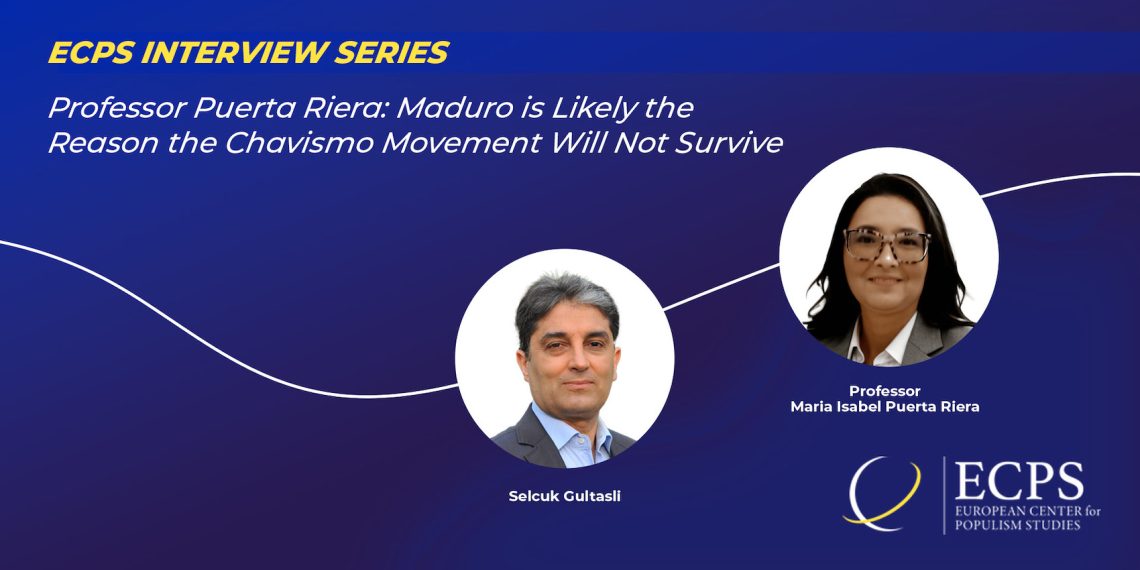Professor Maria Isabel Puerta Riera: Maduro will not concede, recognize his defeat, or agree to any outcome other than his reelection. I think we are going to see a lot more violence coming from the government. Unfortunately, I don’t think Brazil, Colombia, and Mexico understand that their efforts are not enough. They are not going to convince Maduro. The fundamental issue is not just Maduro and his coalition, but the military, which is keeping Maduro in power. The only way Maduro can leave power is if the military turns on him, and that’s not happening. Maduro’s main concern is not power for its own sake but remaining protected to avoid facing justice, both internationally and in the United States, where he faces very serious charges. This is the crux of the issue—Maduro cannot leave power without facing justice.
Interview by Selcuk Gultasli
In an interview on Friday with the European Center for Populism Studies (ECPS), Professor Maria Isabel Puerta Riera, a political scientist at Valencia College, US, assessed the recent controversial elections in her homeland Venezuela and stated that “Maduro has lost support, not just in terms of popularity, but also in the Chavista strongholds that historically voted overwhelmingly for Chavismo and Chavez. He lost these key areas, which were once solidly pro-Chavez, and they now voted against Maduro. As a result, he has decimated whatever was left of the Chavista movement as a popular political force. I’m confident that the movement is pretty much lost. Maduro, who was the heir to Chavez’s legacy, is likely the reason why the movement will not survive.”
Professor Puerta Riera shared her insights into the increasing repression under Maduro’s regime. "What I’m seeing now is an escalation of repression. For example, they are going to the homes of poll watchers and poll workers, taking them into custody without clear charges. These individuals are opposition members." She continued, "What we are witnessing now is beyond the usual repression and persecution. Our impression is that Maduro is radicalizing. He will not concede, recognize his defeat, or agree to any outcome other than his reelection. I think we are going to see a lot more violence coming from the government."
Highlighting the international dynamics, Professor Puerta Riera remarked, "Unfortunately, I don’t think Brazil, Colombia, and Mexico understand that their efforts are not enough. They are not going to convince Maduro. The fundamental issue is not just Maduro and his coalition, but the military, which is keeping Maduro in power." She further emphasized that the only way Maduro could leave power is if the military turns on him, which she does not see happening. “Maduro’s main concern is not power for its own sake but remaining protected to avoid facing justice, both internationally and in the United States, where he faces very serious charges. This is the crux of the issue—Maduro cannot leave power without facing justice.”
In discussing the socioeconomic collapse of Venezuela, she painted a grim picture, "Poverty has now reached the middle class, and we essentially no longer have a middle class. The wealth gap and socioeconomic structure in Venezuela have deteriorated to the point of widespread malnutrition, lower life expectancy and very limited access to health services and education."
With nearly 8 million people having left the country, she questioned, "How does a country sustain itself with an aging population, no social security, and no access to medicines or doctors?" She concluded by emphasizing the dire economic and social scenario, "There’s no way to invest in Venezuela, not just because of the political situation, but also because there is no consumption. The population is decreasing and those who remain have no means to even have a meal."


